Why Does My Puppy’s Breath Smell Like Metal? [7 Causes]
Has your puppy’s breath ever smelled like metal? It’s not uncommon for pet owners to notice this unusual odor from time to time. Understanding the possible causes behind the metallic scent in your furry friend’s breath can be useful in ensuring their overall health and well-being.
If a whiff of iron or steel comes from your super cuddly puppy’s mouth – it can be quite the shock! I get asked often about dog breath by caring family dog owners. So you are NOT alone in wondering.
Several factors can contribute to this metallic smell. One such cause is the presence of blood in the puppy’s mouth, which could be the result of dental issues, injury, or teething. Another possible cause is the ingestion of metal objects, which dogs are known to do.
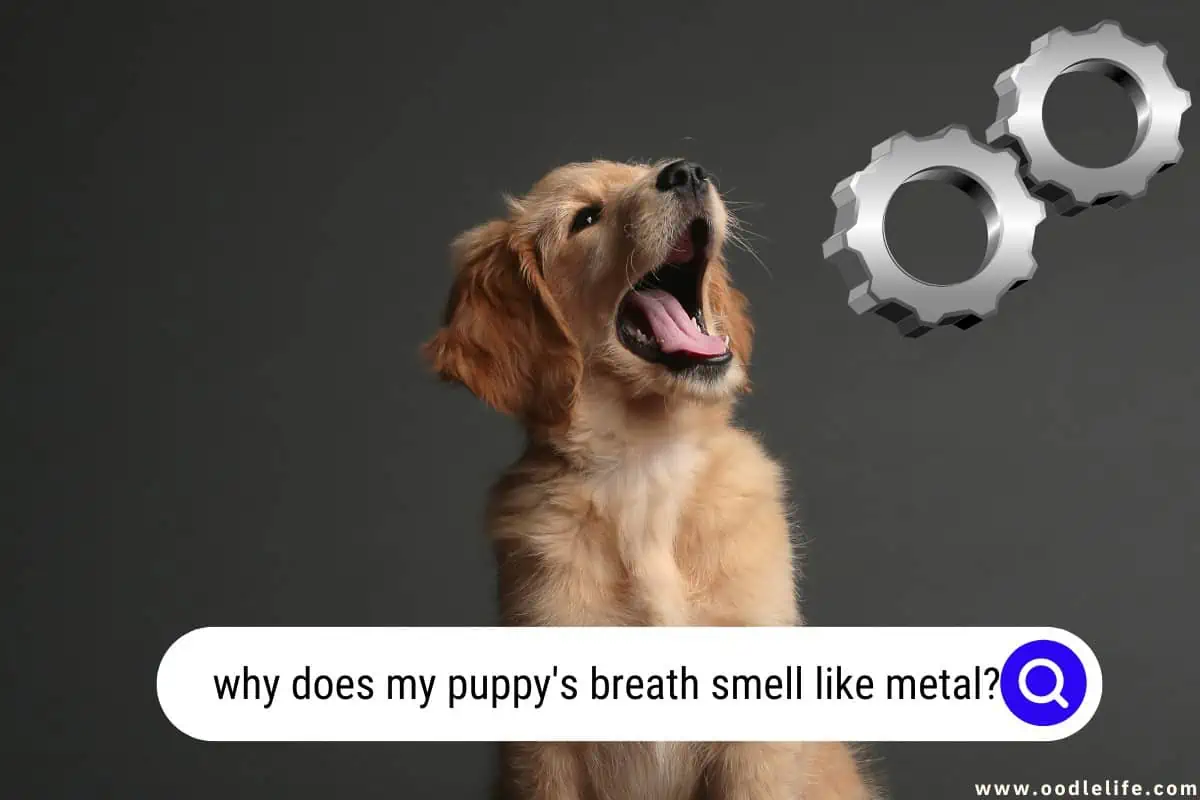
They may be attracted to the shiny appearance or specific odor some metals have. This curiosity may result in a peculiar metallic scent in your pup’s breath. However, it’s important to monitor your puppy closely to ensure they don’t accidentally swallow anything harmful.
Metallic Breath in Puppies
Dental Issues
A common cause for a metallic smell in your puppy’s breath could be related to their dental health. Puppies, like humans, can accumulate plaque and tartar on their teeth, leading to gum inflammation and infection. Teething issues, such as broken teeth or retained baby teeth can also cause a metallic scent as blood and bacteria cause irritation in the gums.
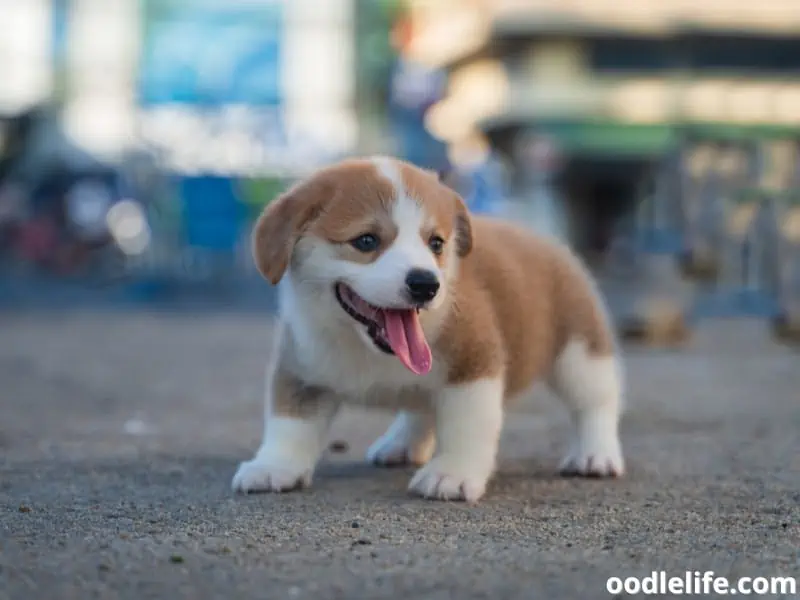
It is essential to monitor your pet’s dental health and provide dental chews, brushing, or regular check-ups with a veterinarian.
Internal Bleeding
If you notice your puppy’s breath suddenly smelling like metal, it could be a sign of internal bleeding. Injuries, trauma, or ulcers can result in bleeding within the mouth, stomach, or throat. Blood has a slightly metallic smell, and if swallowed can cause the breath to take on this odor.
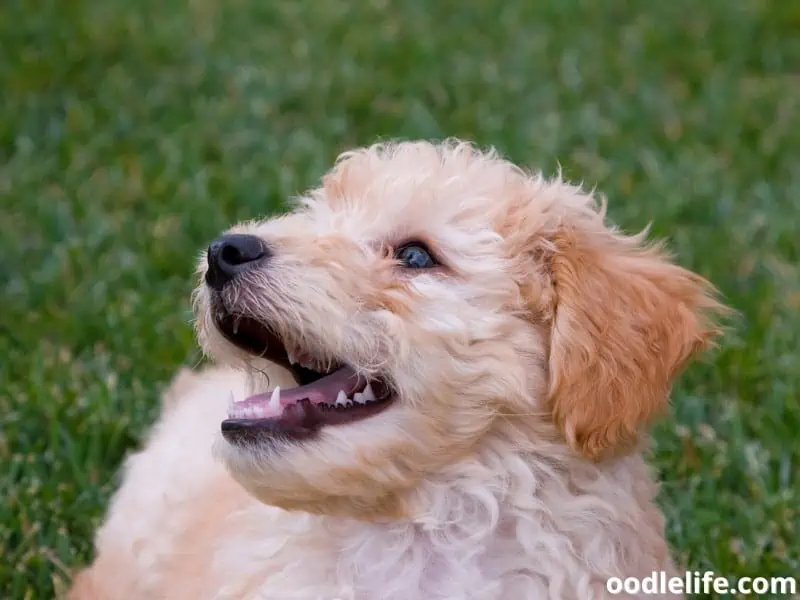
It is crucial to keep a close eye on your puppy and contact a veterinarian if you observe any other symptoms like lethargy, vomiting, or diarrhea.
Infections and Health Conditions
Puppies can experience various health issues like infections or diseases that contribute to a metallic breath smell. Kidney problems or kidney failure, diabetes, oral tumors, and impacted anal glands can all cause unusual breath odors. For example, kidney diseases can result in ammonia-smelling breath, while diabetes may cause a breath that smells sweet yet metallic.

Contact your veterinarian to discuss your concerns and ensure proper care for your pup’s health.
Diet and Habits
Lastly, your puppy’s diet and habits can contribute to a metallic breath smell. Instances of pica, coprophagia (eating feces), or chewing on metallic objects like pennies can result in a distinct metallic scent. Keep an eye on your pet’s behavior, supervise their playtime with toys, and ensure they have access to appropriate chew items, like rawhide bones or teething toys.
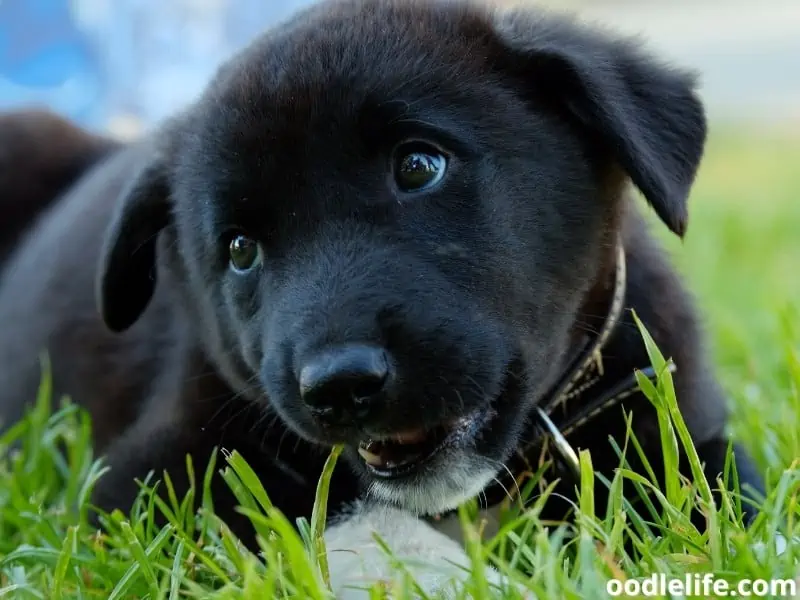
It might also be helpful to consider a pet insurance plan to help cover any potential medical expenses for diet-related issues.
Maintaining your pet’s overall hygiene and health will help prevent or reduce most causes of unusual smelling breath in puppies. Remember to keep an open line of communication with your veterinarian and remain attentive to your puppy’s well-being. With proper care and love, your puppy will thrive and enjoy many years of happy, sweet-scented snuggles.
Prevention and Treatment
Clean Environment
Maintaining a clean environment for your puppy is crucial to prevent bad breath caused by metal smell. Make sure to clean their eating and sleeping areas regularly, as well as keeping their toys and other belongings in hygienic conditions. A clean environment helps ward off harmful bacteria and reduces the chances of developing health problems that may contribute to bad breath.
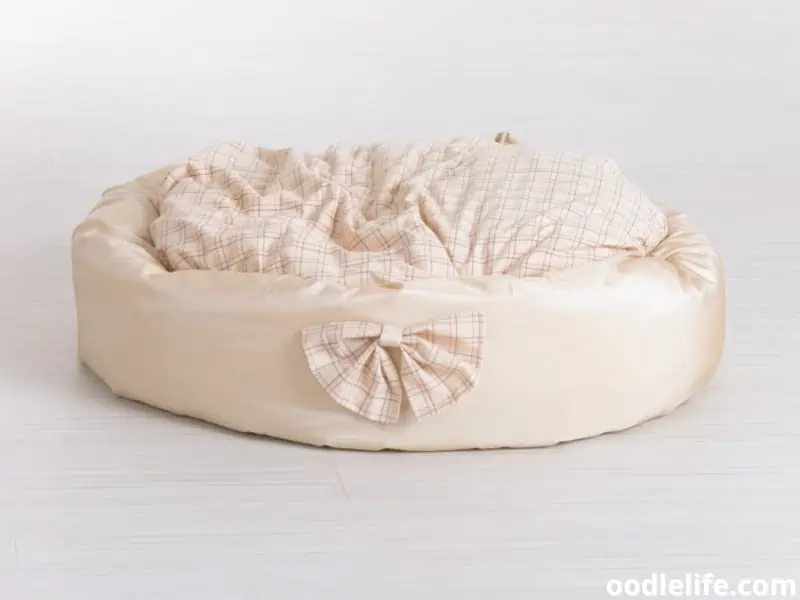
Dental Care
Proper dental care can significantly reduce the risk of dental issues, such as periodontal disease or gum infections, which could cause a metallic smell in your puppy’s breath. Introduce a regular dental care routine, including brushing your puppy’s teeth with a dog-friendly toothpaste, along with offering them dental chews. Dental chews can help remove plaque and bacteria, promoting healthy gums and teeth.
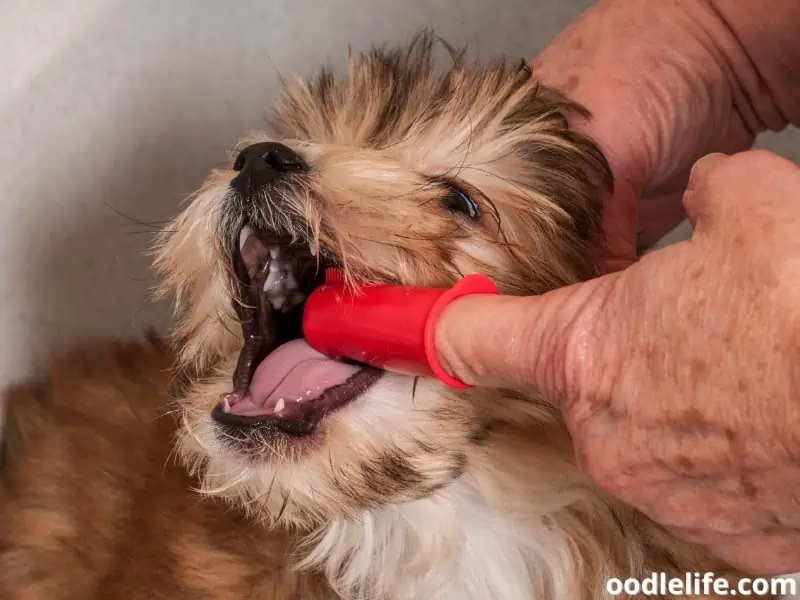
Establishing these habits early in your puppy’s life will make it easier for them to adapt and ensure long-term dental health.
Vet Visits and Health Checkups
To rule out any potential health conditions contributing to your puppy’s metallic breath, make sure to schedule regular veterinarian visits and health checkups. Your vet can examine your puppy’s gums, teeth, and overall health to determine if there are any underlying issues, such as oral tumors or kidney problems. Early detection and intervention can prevent these issues from worsening and impacting your puppy’s breath and overall health.
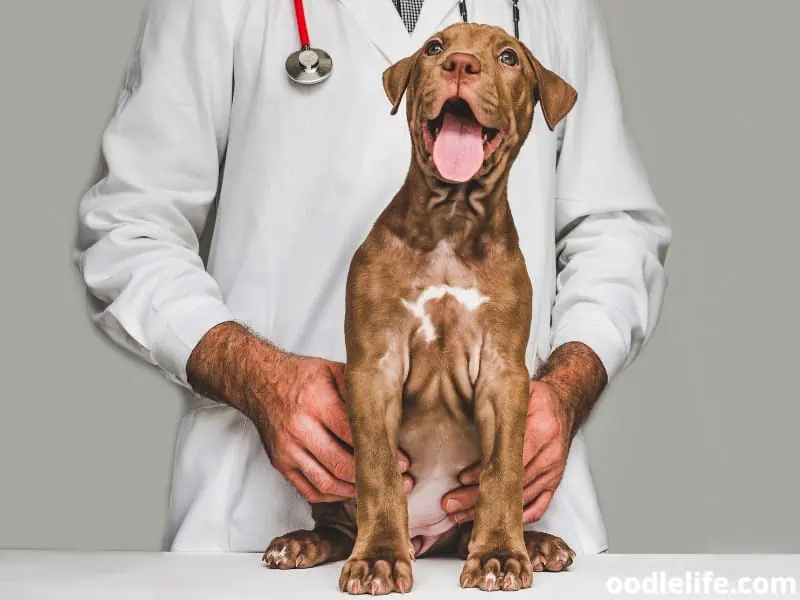
Dietary Adjustments
Modifying your puppy’s diet can play a significant role in preventing and treating bad breath. Provide them with a well-balanced diet that includes high-quality dog food, low in harmful additives, and rich in essential nutrients. You might want to avoid giving your dog kernels or foods that can cause dehydration, as it may contribute to the development of dental problems and bad breath.
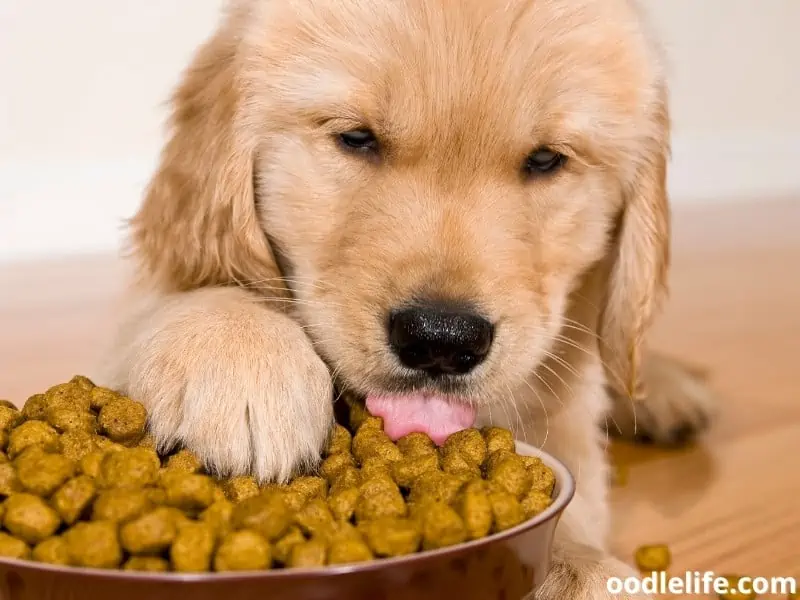
By implementing these practical measures and maintaining a consistent routine, your puppy will be on their way to having fresher breath and a healthier life. Just remember, a happy puppy is a well-cared-for puppy!
Monitoring Your Puppy’s Health
Warning Signs
Monitoring your puppy’s health is essential for their well-being. One unusual symptom to keep an eye on is metallic-smelling breath. It could indicate a health problem.
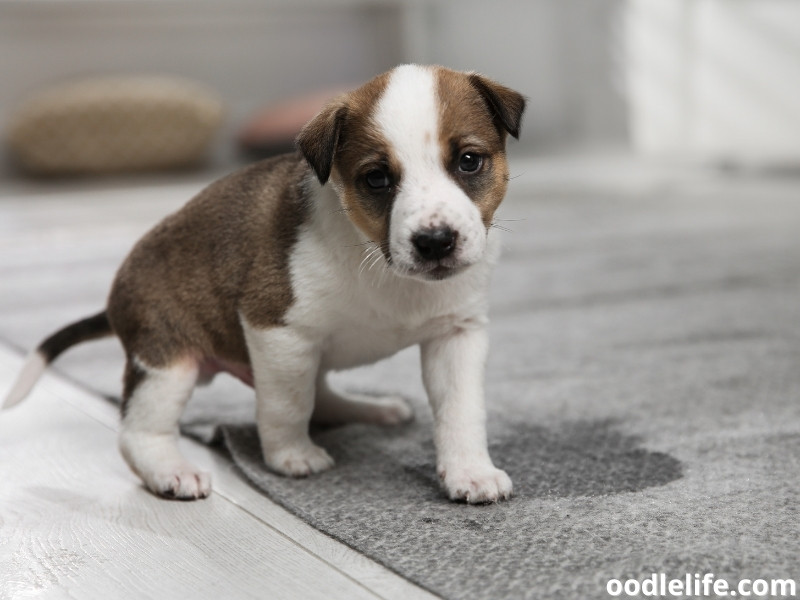
Other warning signs include, but are not limited to:
- Lethargy
- Frequent urination
- Weight loss
- Vomiting
- Diarrhea
- Pale or discolored gums
Remember, an ounce of prevention is worth a pound of cure. Or in dog terms, a bit of nipping your pup’s health problems in the bud is worth a lifetime of wagging tails.
Routine Checkups
Scheduling routine checkups with your veterinarian is a must for maintaining your puppy’s health. These visits help to catch and address any potential health issues before they become severe problems. Don’t wait until your puppy’s breath smells like a rusty tin can.
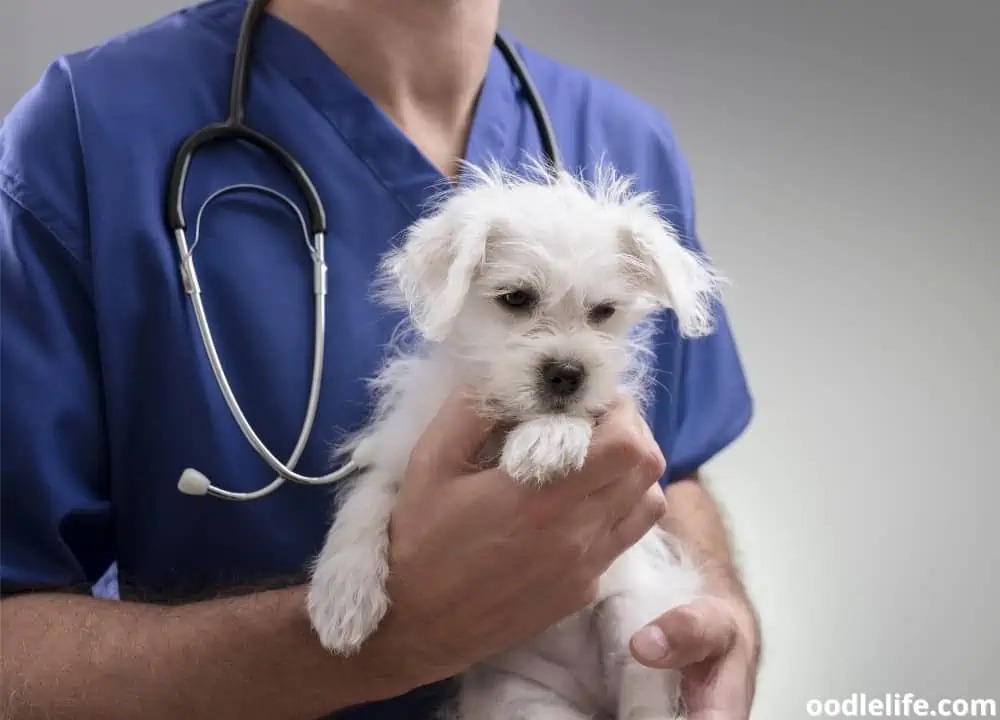
Being proactive, just like that one neighbor who always seems to get their holiday decorations up first, is key.
Proactive Measures
The best way to monitor your puppy’s health is to be proactive.
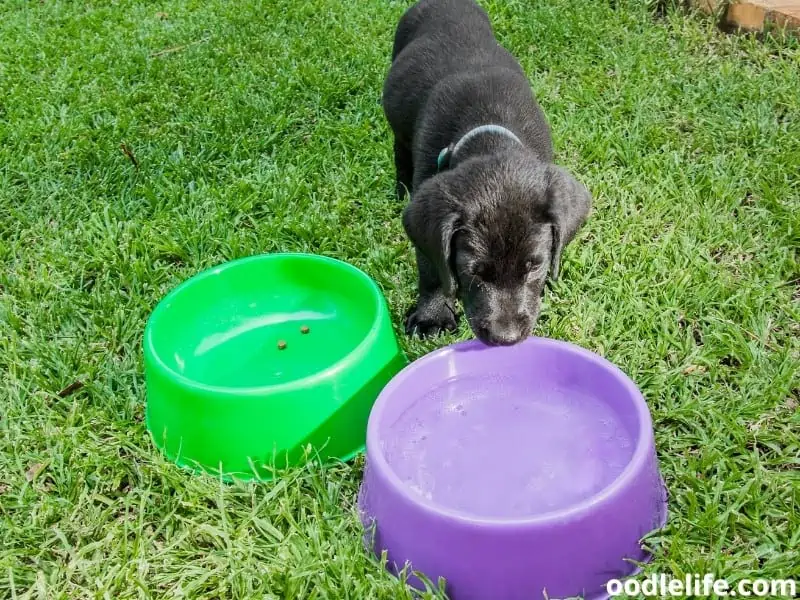
Here are some steps you can take to ensure your furry friend stays in tip-top shape:
- Diet: Providing a balanced and nutritious diet will support your puppy’s growth and overall health. It’s no coincidence that “you are what you eat” applies to dogs too!
- Hydration: Ensuring your puppy has access to clean water is crucial to combat dehydration and maintain good health. Yes, water is just as essential as your morning coffee.
- Exercise: Regular exercise helps keep your puppy active, fit, and at an appropriate weight. Plus, it’s an excellent excuse for you both to bond and enjoy the great outdoors.
- Dental care: Keep a check on your puppy’s breath and gums for any signs of dental problems. After all, those puppy kisses are much more enjoyable without a side of metallic odor.
By paying close attention to warning signs, scheduling routine checkups, and taking proactive measures, you’ll be able to keep your puppy healthy and happy. The more you invest in their well-being, the more tail wags and licks you’ll share together.